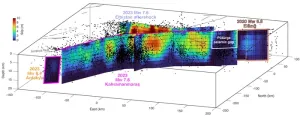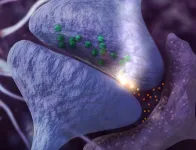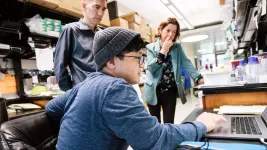Human beings have massively changed the Earth system. Greenhouse-gas emissions produced by human activities have caused the global mean temperature to rise by more than 1.1 degrees Celsius compared to the preindustrial era. And every year, there are additional emissions of carbon dioxide, methane and other greenhouse gases, currently amounting to more than 55 gigatonnes of carbon dioxide equivalent. This unprecedented climate crisis has consequences for the entire planet – the distribution of precipitation is shifting, global sea level is rising, extreme weather events are becoming more frequent, the ocean is becoming more acidic, and anoxic zones continue to expand.
“The climate crisis they themselves caused is likely the greatest challenge that homo sapiens have faced in their 300,000-year history,” says Prof Hans-Otto Pörtner, head of the Integrative Ecophysiology Section at the Alfred Wegener Institute, Helmholtz Centre for Polar and Marine Research. “Yet at the same time another, equally dangerous crisis is unfolding, one that is often overlooked – the dramatic loss of plant and animal species across the planet. The two catastrophes – the climate crisis and biodiversity crisis – are interdependent and mutually amplifying, which is why they should never be seen as two separate things. Consequently, our review study shows in detail the connections between the climate crisis and biodiversity crisis and presents solutions for addressing both catastrophes and mitigating their social impacts, which are already dramatic.”
18 international experts contributed to the study. Just published in the journal Science, it is the outcome of a virtual scientific workshop held in December 2020, which 62 researchers from 35 countries attended. The workshop was jointly coordinated by two organisations belonging to the United Nations: the Intergovernmental Science-Policy Platform on Biodiversity and Ecosystem Services (IPBES) and the Intergovernmental Panel on Climate Change (IPCC). Hans-Otto Pörtner has served as lead author on various Assessment Reports and Special Reports for the IPCC and has been Co-Chair of its Working Group II, tasked with assessing the current state of knowledge on global warming impacts, since 2015.
In their study, the experts describe the rapidly worsening loss of species with the aid of sobering figures: they estimate that human activities have altered roughly 75 percent of the land surface and 66 percent of the marine waters on our planet. This has occurred to such an extent that today e.g. approximately 80 percent of the biomass from mammals and 50 percent of plant biomass has been lost, while more species are in danger of extinction than at any time in human history. In this regard, global warming and the destruction of natural habitats not only lead to biodiversity loss, but also reduce the capacity of organisms, soils and sediments to store carbon, which in turn exacerbates the climate crisis.
Because each organism has a certain tolerance range for changes to its environmental conditions (e.g. temperature), global warming is also causing species’ habitats to shift. Mobile species follow their temperature range and migrate toward the poles, to higher elevations (on land, mountain ranges) or to greater depths (in the ocean). Sessile organisms like corals can only shift their habitats very gradually, in the course of generations: as such, they are caught in a temperature trap, which means that large coral reefs could, in the long term, disappear entirely. And mobile species, too, could run into climatic dead ends in the form of mountain summits, the coasts of landmasses and islands, at the poles and in the ocean’s depths, if they can no longer find any habitat with suitable temperatures to colonise.
In order to address these multiple crises, the researchers propose an ambitious combination of emissions reduction, restoration and protection measures, intelligent land-use management, and promoting cross-institutional competencies among political actors. “Needless to say, a massive reduction of greenhouse-gas emissions and reaching the 1.5-degree target continue to be at the top of the priorities list,” says Hans-Otto Pörtner. “In addition, at least 30 percent of all land, freshwater and marine zones must be protected or restored so as to prevent the greatest biodiversity losses and preserve natural ecosystems’ ability to function. This in turn will help us to combat climate change. For example, the extensive restoration of just 15 percent of the zones that have been converted for land use could be sufficient to prevent 60 percent of the expected extinction events. This would also allow up to 300 gigatonnes of carbon dioxide from the atmosphere to be removed and fixed on a long-term basis; that amounts to 12 percent of all the carbon emitted since the dawn of the industrial era.”
In addition, the study’s authors call for a modern approach to land-use management, one in which protected areas are not viewed as isolated refuges for biodiversity. Rather, they need to be part of a world-spanning network on land and sea alike that interconnects comparatively untouched regions via migration corridors for the various species. In this regard, Indigenous peoples and local communities in particular must be supported for their efforts to protect and restore nature. When it comes to regions that are intensively used for agriculture and fishing, the focus should be on sustainability. With the aid of modern concepts, both resource-conserving forms of use and a reliable food supply for the human race have to be ensured. Here, those concepts that lead to intensified carbon dioxide uptake and carbon fixation in biomass and soils are to be given priority. Also, sufficient havens must be created for species that make harvests possible to begin with – like the insects that pollenate fruit trees. Lastly, improving the carbon dioxide balance should be the absolute priority in cities.
“In the future, all of this will only work if – for all approved measures – climate protection, biodiversity preservation, and social advantages for local communities are pursued simultaneously,” says Pörtner. “We’re unlikely to reach the new global biodiversity, climate and sustainability targets planned for 2030 and 2050 if the individual institutions fail to collaborate more intensively. Take for example the separate UN conventions on biodiversity and climate protection, i.e., the Convention on Biological Diversity and the United Nations Framework Convention on Climate Change. They address the two crises too separately and are also focused on the national interests of the parties to the conventions. Here, we urgently need a comprehensive approach if we still hope to reach the targets.”
Original publication:
H.-O. Pörtner, R. J. Scholes, A. Arneth, D.K.A. Barnes, M.T. Burrows, S.E. Diamond, C.M. Duarte, W. Kiessling, P. Leadley, S. Managi, P. McElwee, G. Midgley, H.T. Ngo, D. Obura, U. Pascual, M. Sankaran, Y.J. Shin, A.L. Val: Overcoming the coupled climate and biodiversity crises and their societal impacts. Science (2023). DOI: https://doi.org/10.1126/science.abl4881
Notes for Editors:
EMBARGOED until 20:00 CEST (14:00 US Eastern Time, 19:00 London Time) on Thursday, 20 April 2023
You can find printable images after expiry of the embargo period in the online version of this press release: https://www.awi.de/en/about-us/service/press.html
Your contact partner at the Alfred Wegener Institute is Prof. Dr. Hans-Otto Pörtner (e-mail: hans.poertner@awi.de).
If you have any further questions, Nils Ehrenberg, tel. +49 (0)471 4831 2008 (e-mail: media@awi.de) at the AWI’s Communications and Media Relations Department will be happy to help you.
Follow the Alfred Wegener Institute on Twitter (https://twitter.com/AWI_Media), Instagram (https://www.instagram.com/awiexpedition/) and Facebook (www.facebook.com/AlfredWegenerInstitute).
The Alfred Wegener Institute, Helmholtz Centre for Polar and Marine Research (AWI) conducts research in the Arctic, Antarctic and oceans of the high and mid-latitudes. It coordinates polar research in Germany and provides major infrastructure to the international scientific community, such as the research icebreaker Polarstern and stations in the Arctic and Antarctica. The Alfred Wegener Institute is one of the 18 research centres of the Helmholtz Association, the largest scientific organisation in Germany.
END


